Did you know that businesses using a CRM system experience a 29% increase in sales?
In today’s fast-paced business environment, managing customer relationships effectively is not just a competitive advantage—it’s a necessity. As Azizul Haque, a seasoned CRM expert with years of experience helping businesses optimize their customer relationship management strategies, I understand the critical role that the right CRM system plays in driving growth and enhancing customer satisfaction.
Selecting the best CRM for distributors can be a game-changer for your business. Whether you’re a small startup or an established enterprise, the right CRM solution can streamline your operations, improve customer retention, and ultimately boost your bottom line. In this comprehensive guide, we’ll delve into the top CRM solutions tailored specifically for distributors, compare their key features, pricing structures, and ideal use cases, and help you make an informed decision that aligns with your business goals.
What to Look for in a CRM for Your Business
Scalability
One of the most critical factors to consider when choosing a CRM is scalability. As your distribution business grows, your CRM needs to evolve with you. A scalable CRM can handle increasing amounts of data, support more users, and adapt to your expanding operational requirements without compromising performance. Look for CRM systems that offer flexible pricing plans, modular features, and the ability to integrate with other tools as your business scales.
Ease of Use
Implementing a new CRM can be daunting, especially for small teams or those new to CRM systems. An intuitive interface and a straightforward onboarding process are essential to ensure that your team can adopt the system quickly and efficiently. A user-friendly CRM minimizes the learning curve, reduces the time spent on training, and encourages higher user adoption rates, leading to better data management and customer interactions.
Customization
Every distribution business has unique workflows and requirements. Therefore, a CRM that offers customizable features is crucial. The ability to tailor the CRM to fit your specific processes, whether it’s customizing dashboards, setting up unique reporting metrics, or integrating with niche industry tools, ensures that the system supports your business operations effectively. Customization also allows you to adapt the CRM as your business needs change over time.
6 Best CRM Solutions for Distributors
When it comes to finding the best CRM for distributors, several solutions stand out due to their robust features, scalability, and user-friendly interfaces. Here are the top six CRMs that are particularly well-suited for distribution businesses:
1. HubSpot CRM
HubSpot CRM is a popular, user-friendly platform that offers powerful tools for managing customer relationships, making it one of the best CRMs for distributors. It combines marketing, sales, and customer service into a unified system, providing real-time visibility into sales pipelines and customer interactions.
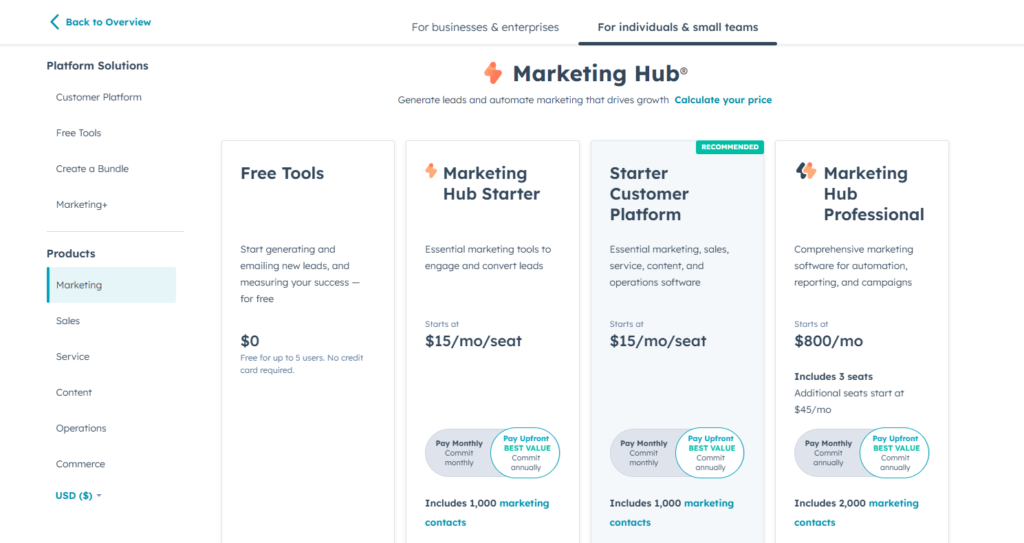
Key Features:
- Contact Management: Easily organize and track leads, contacts, and customer interactions.
- Sales Pipeline: Visual sales pipeline management helps distributors monitor deals and forecast sales more effectively.
- Email Tracking & Automation: Distributors can automate follow-ups and track email opens, clicks, and responses.
- Live Chat & Chatbots: Engage with customers directly on your website to streamline inquiries and support.
- Reporting Dashboard: Robust analytics and reporting tools to track performance and optimize distribution strategies.
Pricing:
- Free Plan: $0 for core features.
- Starter Plan: $15/month (ideal for small distributors starting with CRM).
- Professional Plan: $800/month (offers advanced automation and customization).
- Enterprise Plan: $3,600/month (suitable for larger distributors needing comprehensive tools).
HubSpot CRM is best suited for small to medium-sized distributors looking for an easy-to-use, scalable platform that offers a free tier and grows with their business.
2. Zoho CRM
Zoho CRM is a versatile and affordable CRM solution, ideal for distributors of all sizes. It provides a wide range of features to manage customer relationships, automate workflows, and analyze sales performance, making it a great option for distribution businesses looking to enhance their sales and customer engagement.
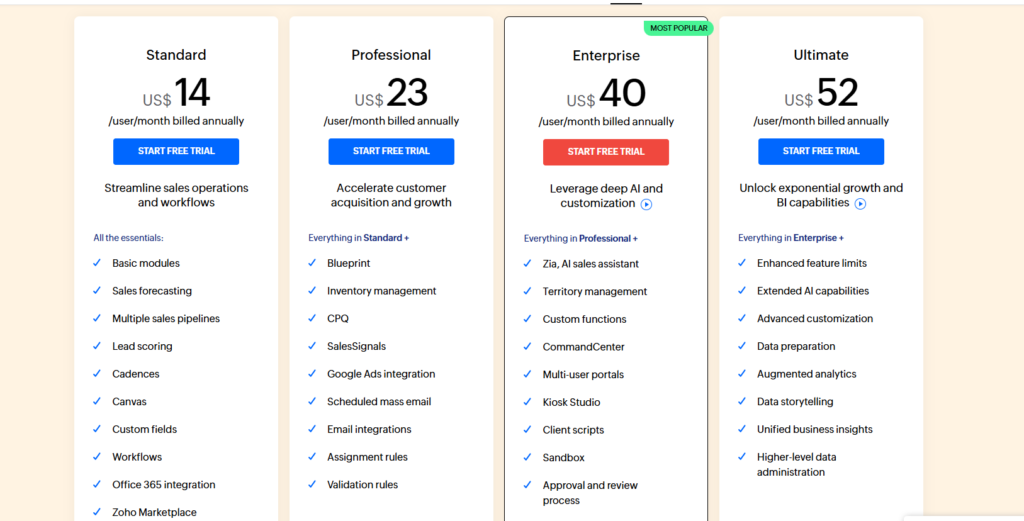
Key Features:
- Sales Automation: Automate lead generation, scoring, and follow-ups to streamline the distribution process.
- Inventory Management: Track inventory levels, manage orders, and streamline supply chain operations.
- Omnichannel Communication: Engage customers via email, social media, chat, and phone from a single interface.
- Customizable Dashboards: Tailor dashboards to track key distribution metrics and sales goals.
- AI-Powered Analytics: Zoho’s AI tool, Zia, helps analyze sales patterns, predict trends, and suggest improvements.
Pricing:
- Free Plan: $0 (limited features for up to 3 users).
- Standard Plan: $14/user/month (basic CRM features).
- Professional Plan: $23/user/month (advanced automation and inventory management).
- Enterprise Plan: $40/user/month (AI-driven insights and deeper customization).
- Ultimate Plan: $52/user/month (premium features and dedicated support).
Zoho CRM is best suited for small to medium-sized distributors who need affordable, customizable solutions with powerful automation and inventory management features. It’s ideal for those looking for robust functionality without breaking the bank.
3. Salesforce Sales Cloud
Salesforce CRM is one of the most powerful and widely used CRM platforms, known for its extensive customization, scalability, and integrations. It offers a range of tools designed to streamline sales processes, manage customer relationships, and provide in-depth analytics, making it an excellent choice for distributors with complex needs.
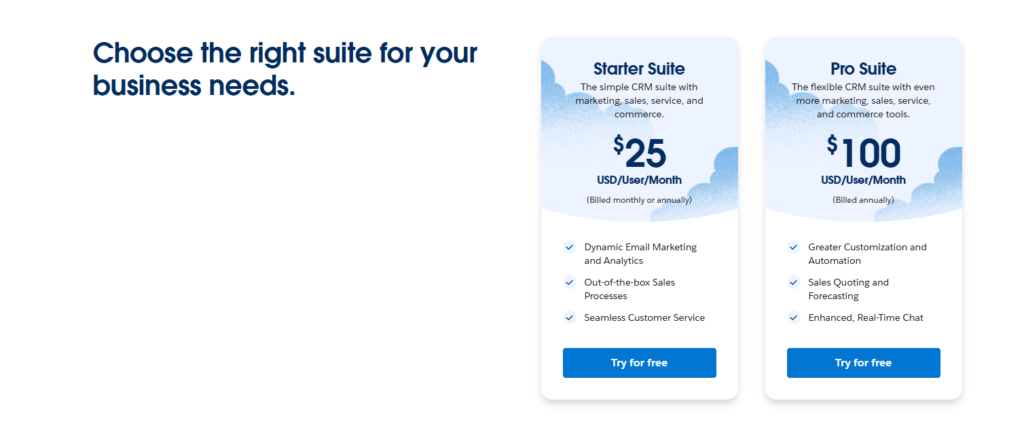
Key Features:
- Sales Cloud: Provides robust sales management features, including pipeline tracking and automation, perfect for distributors managing high volumes of orders.
- Customizable Workflows: Tailor processes to match the specific needs of your distribution business, allowing for greater efficiency.
- Advanced Reporting and Analytics: Access deep insights into sales performance, customer behavior, and distribution operations.
- AppExchange Integrations: Seamlessly integrate with thousands of third-party apps, such as inventory and accounting tools.
- Mobile Accessibility: Manage customer data and sales pipelines on the go with a mobile-optimized platform.
Salesforce CRM is best suited for medium to large distributors with complex sales processes who require a highly customizable, scalable CRM solution that can integrate with multiple business tools and provide comprehensive analytics. It’s ideal for distributors looking to scale quickly and need advanced features.
4. Pipedrive CRM
Pipedrive CRM is a sales-focused CRM designed to help distributors manage and optimize their sales pipeline. Its intuitive interface and straightforward features make it easy for distributors to track leads, monitor deals, and improve sales efficiency. Pipedrive’s visual sales pipeline is particularly effective for distributors looking to streamline their sales processes.
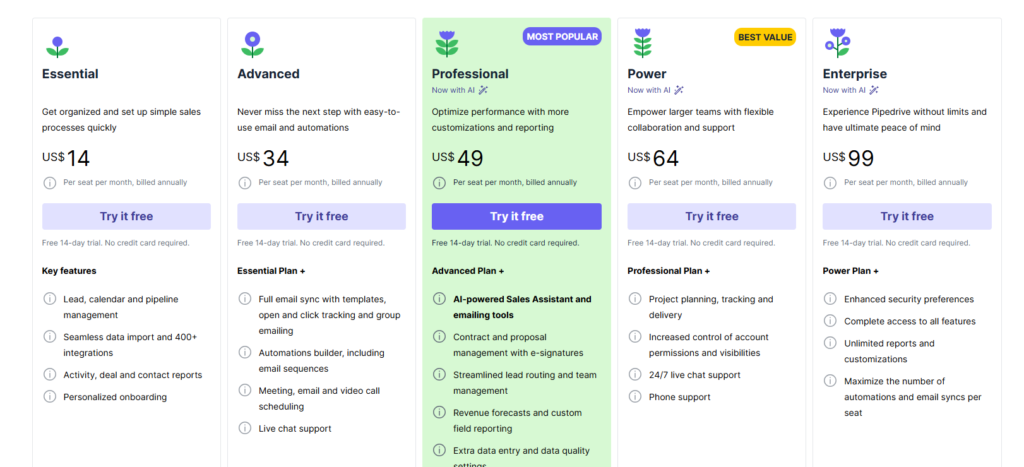
Key Features:
- Visual Sales Pipeline: Provides a clear visual overview of the sales process, helping distributors track deals at various stages and manage their workflow efficiently.
- Automation & Workflow Management: Automate repetitive tasks such as follow-ups, reducing manual effort and improving productivity.
- Lead & Deal Management: Easily track leads and manage deals, ensuring that nothing slips through the cracks during the distribution process.
- Email Integration: Integrates with your email to track communication and schedule follow-ups, keeping everything in one place.
- Mobile App: Allows distributors to manage their pipeline on the go, making it easier to handle sales and customer interactions from anywhere.
Pricing:
- Essential Plan: $14/month per user.
- Advanced Plan: $34/month per user.
- Professional Plan: $49/month per user.
- Power Plan: $64/month per user.
- Enterprise Plan: $99/month per user.
Pipedrive is best suited for small to medium-sized distributors with a heavy focus on sales. It’s perfect for teams looking for a simple yet effective way to manage their sales pipeline, automate workflows, and improve deal tracking without overwhelming complexity.
5. Nimble CRM
Nimble CRM is a social-focused CRM designed to help distributors manage customer relationships by integrating social media interactions alongside traditional sales activities. Its easy-to-use interface and powerful social media integration make it ideal for distributors looking to engage with clients across multiple channels and build stronger customer relationships.
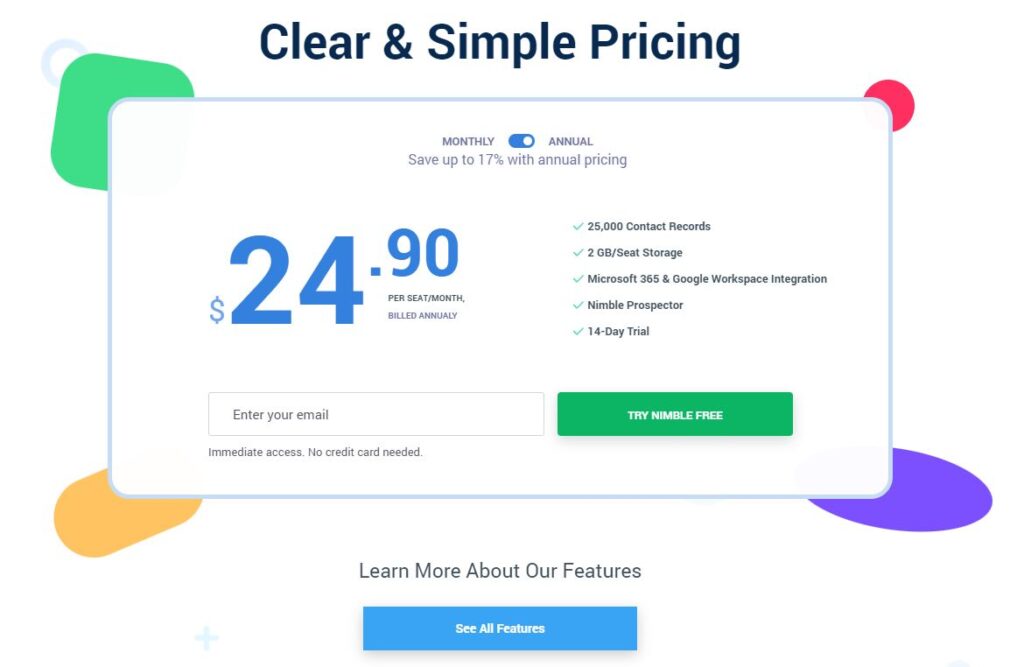
Key Features:
- Unified Contact Management: Combines contacts from multiple platforms (email, social media, etc.) into a single view, helping distributors track all interactions in one place.
- Social Media Integration: Tracks customer interactions on platforms like LinkedIn, Twitter, and Facebook, giving distributors a 360-degree view of their customers.
- Pipeline Management: Manage and track sales opportunities, ensuring distributors stay on top of deals and orders.
- Smart Social Insights: Automatically enriches contact profiles with social data, helping distributors understand customers better and personalize interactions.
- Email Tracking & Group Messaging: Track email opens and clicks, and send personalized group messages to customers for more efficient communication.
Pricing:
- Nimble Business Plan: $24.90/user/month.
Nimble CRM is best suited for small to medium-sized distributors who prioritize relationship-building and customer engagement via social media. It’s ideal for businesses looking for a simple yet powerful CRM that integrates social selling with traditional sales and customer management.
6. Microsoft Dynamics 365 CRM
Microsoft Dynamics 365 is a comprehensive CRM and ERP platform designed to streamline business operations, foster customer relationships, and improve decision-making through advanced AI-driven insights. It’s an adaptable and scalable solution that integrates with other Microsoft services.
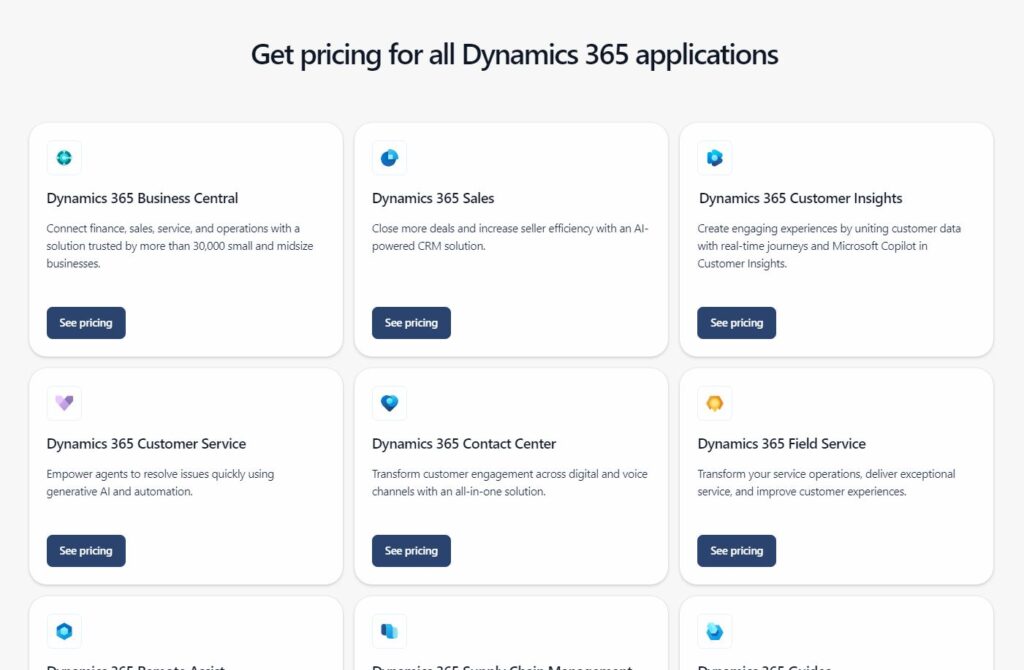
Key Features:
- Unified Customer Data: Consolidates data from various sources to provide a 360-degree view of customers.
- AI & Analytics: Uses AI-driven insights for predictive analytics and personalized customer experiences.
- Sales Automation: Automates sales workflows, manages pipelines, and tracks leads efficiently.
- Customer Service Module: Enhances customer support with multichannel service tools, including self-service portals, live chat, and more.
- Marketing Automation: Includes email marketing, customer segmentation, and event-driven campaigns to target the right audience.
- Integrations: Seamless integration with Microsoft tools like Office 365, Teams, and LinkedIn for enhanced productivity.
Enterprises and mid-sized businesses looking for a powerful, customizable CRM that integrates with a wide range of Microsoft products, perfect for those needing both CRM and ERP capabilities.
Each of these CRMs offers unique strengths that cater to the specific needs of distributors, from advanced sales automation to comprehensive analytics and seamless integrations.
Which CRM is Best for Your Distribution Business?
After evaluating the top CRMs based on scalability, ease of use, customization, and specific features tailored for distributors, Salesforce Sales Cloud emerges as the best CRM for distributors. Its extensive customization options, robust reporting capabilities, and seamless integration with a wide array of tools make it an ideal choice for businesses looking to scale and optimize their distribution processes.
Use Case Recommendations
While Salesforce Sales Cloud is the overall top recommendation, different businesses may have varying needs:
- Small to Medium-Sized Distributors: Zoho CRM offers excellent value with its comprehensive feature set and affordability, making it ideal for growing businesses.
- Startups and New Businesses: HubSpot CRM provides a free tier with essential features, perfect for businesses just starting with CRM systems.
- Enterprise-Level Distributors: Microsoft Dynamics 365 offers powerful customization and integration capabilities, suitable for large organizations with complex requirements.
- Sales-Focused Teams: Pipedrive excels in sales pipeline management, making it a great choice for teams prioritizing sales activities.
- Social Media Integration Needs: Nimble offers strong social media integration, beneficial for businesses focusing on social selling and customer engagement.
Choosing the right CRM is a significant decision that can transform your distribution business. I encourage you to take actionable steps towards optimizing your customer relationship management:
- Start a Free Trial: Most CRM providers offer free trials. Take advantage of these to explore the features and see how they fit your business needs.
- Schedule a Demo: Engage with CRM providers to get a personalized demonstration tailored to your specific workflows and requirements.
- Evaluate Your Needs: Assess your business processes, identify pain points, and determine which CRM features are most critical for your operations.
- Compare Pricing Plans: Ensure that the CRM you choose aligns with your budget while providing the necessary features and scalability.
How to Choose a CRM: A Beginner’s Buying Guide for Distributors
Selecting the right CRM can be overwhelming, especially if you’re new to customer relationship management systems. Here’s a step-by-step guide to help you make an informed decision:
1. Identify Your Business Needs
Start by outlining your business goals and the challenges you’re facing in managing customer relationships. Do you need better sales tracking, improved customer support, or more efficient data management? Understanding your needs will help you narrow down the CRM options that offer the features you require.
2. Evaluate Key Features
Look for CRMs that offer essential features such as:
- Sales Automation: Streamline your sales processes with automated workflows and lead management.
- Customer Support: Enhance customer satisfaction with robust support and ticketing systems.
- Analytics and Reporting: Gain insights into your sales performance and customer behavior with advanced reporting tools.
- Integration Capabilities: Ensure the CRM can integrate seamlessly with your existing tools and software.
3. Consider Budget Constraints
CRMs come in various pricing tiers, from free versions to premium packages. Determine your budget and consider the total cost of ownership, including any additional fees for integrations or advanced features. Look for CRMs that offer flexible pricing plans that can grow with your business.
4. Assess Ease of Use
A CRM should be easy to navigate and use. Request a demo or take advantage of free trials to assess the user interface and overall user experience. A user-friendly CRM will facilitate quicker adoption and better utilization by your team.
5. Check Customization Options
Your business processes are unique, and your CRM should reflect that. Ensure the CRM offers customization options such as customizable dashboards, fields, and workflows. This flexibility allows you to tailor the system to meet your specific needs.
6. Review Customer Support
Reliable customer support is crucial, especially during the initial setup and implementation phases. Check if the CRM provider offers comprehensive support options, including live chat, email support, and extensive knowledge bases.
7. Read Reviews and Testimonials
Research what other businesses, particularly distributors, are saying about the CRM solutions you’re considering. Reviews and testimonials can provide valuable insights into the CRM’s performance, reliability, and customer satisfaction levels.
8. Plan for Scalability
Choose a CRM that can scale with your business growth. Consider factors like the number of users, data storage limits, and the ability to add new features or integrations as your business expands.
Conclusion
Selecting the best CRM for distributors is a pivotal decision that can significantly impact your business’s efficiency, customer satisfaction, and overall growth. By carefully evaluating your business needs, considering key features, and assessing the scalability and customization options of each CRM, you can make an informed choice that aligns with your long-term goals.
Remember, the right CRM is not just a tool but a strategic asset that can transform how you manage customer relationships and drive your business forward. Take the time to explore your options, utilize free trials and demos, and choose a CRM that will support your business as it grows and evolves.
As you embark on the journey to enhance your customer relationship management, keep in mind the importance of aligning your CRM choice with your long-term business objectives. A CRM that offers flexibility, robust features, and seamless integration will not only meet your current needs but also adapt to future challenges and opportunities. Invest in a CRM that empowers your team, enhances customer interactions, and drives sustainable growth.
Ready to take your distribution business to the next level with the best CRM for distributors? Explore and compare the top CRM solutions mentioned in this guide, and start your free trial or schedule a demo today. Click the links below to discover more and find the perfect CRM to suit your business needs.
FAQs
Do I really need a CRM?
Absolutely. A CRM system helps you manage and analyze customer interactions, streamline processes, and improve customer satisfaction, leading to increased sales and business growth.
How secure is my data in a CRM?
Most reputable CRM providers implement robust security measures, including data encryption, secure access controls, and regular security audits to protect your data. It’s essential to choose a CRM that complies with industry standards and regulations.
Can a CRM integrate with my existing tools?
Yes, many CRMs offer extensive integration capabilities with various tools and software, such as email marketing platforms, accounting software, and e-commerce solutions, ensuring seamless data flow across your business systems.
What is the cost of implementing a CRM system?
The cost varies depending on the CRM provider, the number of users, and the features you require. CRM solutions range from free tiers to premium packages that can cost several hundred dollars per month. It’s important to evaluate the total cost of ownership, including any additional fees for integrations or advanced features.
How long does it take to set up a CRM?
The setup time depends on the complexity of the CRM and your specific business needs. For simpler CRMs, setup can take a few days, while more complex systems might require several weeks for full implementation, including customization and data migration.
Can a CRM help improve customer retention?
Yes, a CRM can significantly enhance customer retention by providing better insights into customer behavior, enabling personalized interactions, and ensuring timely follow-ups, all of which contribute to a better customer experience.
What are the key features to look for in a CRM for distributors?
Key features include sales automation, inventory management, order tracking, robust reporting and analytics, customization options, integration capabilities, and scalability to support your growing business needs.
Is training required to use a CRM effectively?
While many CRMs are user-friendly, some training can help your team leverage the system’s full potential. Most CRM providers offer training resources, tutorials, and customer support to assist with onboarding and ongoing use.
Can a CRM system handle multiple sales channels?
Yes, advanced CRM systems are designed to manage and integrate multiple sales channels, providing a unified view of customer interactions across various platforms, including online, in-store, and social media.
How does a CRM improve sales performance?
A CRM improves sales performance by automating repetitive tasks, providing detailed insights into customer behavior, facilitating better lead management, and enabling more effective sales strategies based on data-driven decisions.
A seasoned professional specializing in CRM, SEO, and Social Media Marketing (SMM). With a deep understanding of customer relationship management, I help businesses optimize their digital strategies to enhance customer engagement and drive growth. Passionate about delivering measurable results through data-driven techniques and effective marketing solutions.
Let me know if you’d like any adjustments!


